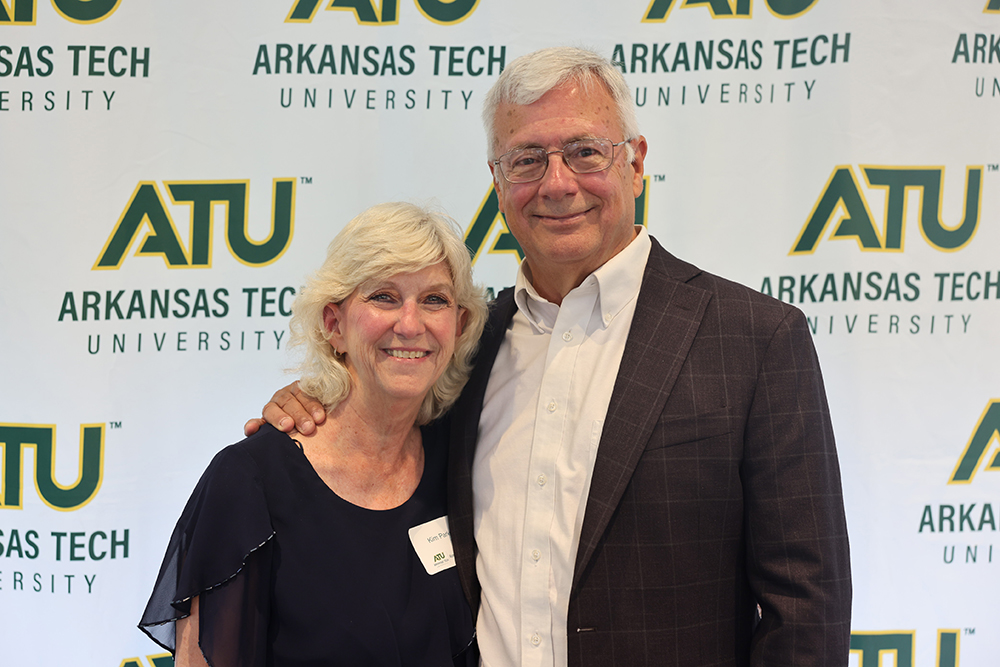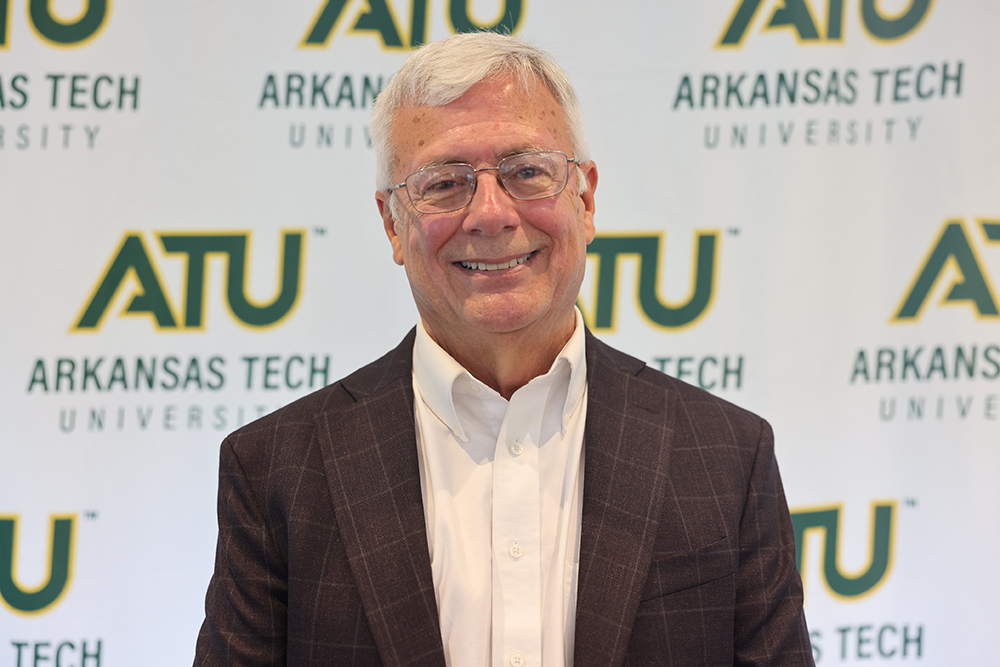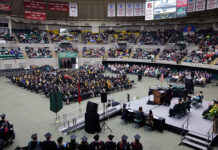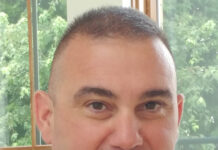It was the first thing you saw when you walked through the door.
There, in room 103 at Witherspoon Hall, sat a Ludwig drum set. Sparkly silver and shining, just like it was the day 14-year old Philip Parker bought it in 1968. Just like the one Ringo played.
A love for music first sparked by those long-haired kids from Liverpool carried Parker from his grandfather’s wheat fields to study music among the Shockers. He eventually left his home state of Kansas, first to earn his master’s degree at Indiana University and then to accept the only full-time job he ever held — music faculty member at Arkansas Tech University.
Forty-seven years after Gene Witherspoon stuck out his right hand and offered him a job, Parker retired from Arkansas Tech on May 11, 2024, at the rank of professor of music.
“I could never have imagined when I was in college how much I would enjoy this,” said Parker. “The quality of the students, not just musically, but as individuals…this has been a fantastic place to work. My colleagues…amazing musicians, amazing teachers. I can’t remember a day that I wasn’t pretty excited to come to school. College students are a great age to teach. They’re here because they want to be here and they’re studying this course because they enjoy this subject. You’re able to teach them music and talk about music. How can anything be any better than that?”
A native of Clearwater, Kan., Parker started playing in his school band in seventh grade. It wasn’t until he started taking lessons from Dennis Melhouse during his junior year in high school that the idea of studying music in college occurred to him.
“He taught me so many of the nuances of music through percussion,” said Parker when speaking of Melhouse. “He really made me understand, much more in depth, how all of this is put together and the finer points of playing.”
That understanding led Parker to explore a world beyond playing music. He wanted to learn how to compose it. Before long, he found himself spending many of his lunch periods studying conductor’s scores.
“I studied how it was all put together…the ranges of the instruments…how this transposing thing works,” said Parker. “It was simply self-taught at that point, but when I got into college I studied with an incredible composition teacher, Walter Mays. I would say he was the No. 1 mentor in my life. I never majored in composition, but I took classes from him every semester for four years. It was something I always enjoyed just as much as playing the drums.”
Under the guidance of Mays and others on the Wichita State University faculty, Parker earned a Bachelor of Music degree. He earned an opportunity to attend Indiana University, where he received a Master of Music degree.
By that point, there was no doubt music was Parker’s career path. But it wasn’t his only responsibility. For 20 years, he returned in the summer to his grandfather’s wheat fields and helped work the family land.
“Farming was in my blood,” said Parker.
Turns out driving a tractor with no roof around a field all day long provides one with quite a tan.
That came in handy when Parker and his wife, Kim, visited Russellville, Ark., in late July 1977 to interview for a faculty position at Arkansas Tech.
Among the people Parker met was Dr. Jim Ed McGee, ATU vice president for academic affairs and an old farmhand himself. Upon learning that Parker’s tan was the result of many hours in the wheat field, McGee had a simple piece of advice for the chair of the music department.
“He goes, ‘Witherspoon, hire him!’,” recalled Parker. “That was encouraging.”
On the day the Parkers were scheduled to leave Russellville, Witherspoon called Parker into his office and offered him the job.
“He stuck out his hand and said welcome to the family,” said Parker. “What I assumed he was saying was welcome to this music department faculty, but I came to realize pretty quickly that family is a huge group of band directors, choir directors, professional musicians and on and on and on. That first year I was awestruck by how many alumni welcomed me. It was definitely a family. It was fantastic.”
Of all the faculty members Witherspoon played a role in hiring during his 29 years at Arkansas Tech, Parker was the last one to retire. The two only worked together for a year-and-a-half before Witherspoon passed away as a result of a heart attack on Jan. 14, 1979.
“The students loved him,” said Parker. “He had a magnetic personality. His whole presence was larger than life. He was so well connected with so many famous people in the band world and the music world. He definitely was in charge. You hear a lot of alumni talk about this situation or that situation…he kept things under control and the students weren’t going to buck him. He was so kind to me.”
As a young faculty member, Parker watched as Dr. Robert Casey took on two unenviable tasks: replacing Witherspoon as department head and finding a successor for Witherspoon as director of bands.
“Man, did (Casey) knock it out of the park,” said Parker. “And an Arkansas guy, to boot, in Hal Cooper. Within a couple of years, the band played at all-state…it’s on an LP…it was a tremendous performance. From then on, everyone knew this guy was going to be okay. (Cooper’s) ear is tremendous. The intonation, particularly in the marching bands with the brass, was always impeccable. He was an easy man to work with. That’s another thing about this department. Everyone has always gotten along.”
That collegiality translated into stability. Parker and Cooper were joined in the ATU Department of Music by long-time colleagues such as Andy Anders, Dr. Gary Barrow, Nita Herrick Colpitts, Ed Connelly, Karen Futterer, Ken Futterer and Vicky Kiehl. As the years and decades passed, their collective efforts continued to elevate the reputation of ATU’s music program.
“We always had really excellent players,” said Parker. “I go back and listen to those shows, and I’m blown away. The more training and practice they had in high school…that’s going to tell you a lot about what their potential is. One thing you certainly have to have is a work ethic. If you’re willing to practice, I’ve seen some kids make unbelievable progress.”
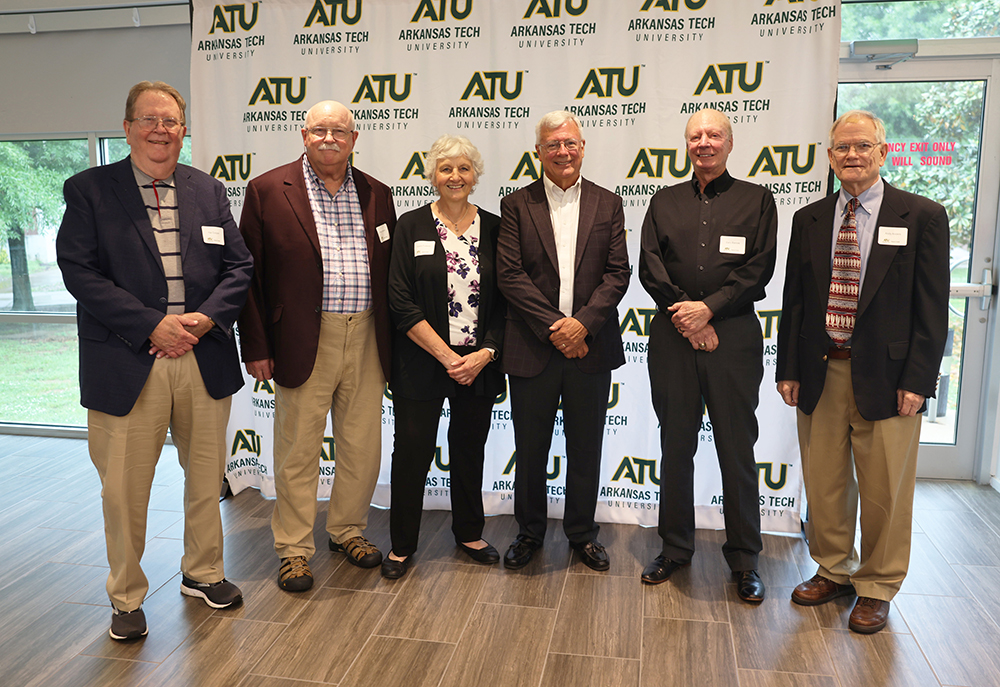
Parker’s composing legacy at Arkansas Tech is defined by two pieces.
“A New Horizon” was commissioned for the opening of Ross Pendergraft Library and Technology Center. It was performed at the building’s dedication on Oct. 30, 1999.
“There was all this new technology coming to campus and this big, new building at the top of the hill,” said Parker. “Julie (Morgan) thought it would be nice to have a piece commissioned for the opening of the library. I took our alma mater and I wrote a four or five-minute piece. You don’t necessarily even recognize our alma mater at the beginning of it. It’s a fanfare kind of thing. You hear hints of it, and then there’s a middle section where you hear it as we know the melody, but I reharmonized it. Then there’s a flashy ending to it. It was a pleasure to write.”
A decade later, as ATU prepared to observe its 100-year anniversary, Parker was commissioned to create a piece as large as the moment. The result was “Celebration.”
“I connected it to Tech through the music department,” said Parker. “In the first 100 years, we only had three band directors: (Marvin) Williamson, (Gene) Witherspoon and (Hal) Cooper. I used their last names as rhythmic motives. Williamson has this dotted eighth, 16th, eighth…dom de-de dom, dom de-de dom…Williamson, Williamson, right? Witherspoon is da-da-da, and Cooper is bomp bomp. And so those three motives are all the time going on at places in the piece.”
“Celebration” was later performed by the ATU Symphonic Wind Ensemble under the baton of Dr. Daniel A. Belongia at Carnegie Hall in December 2021.
Parker’s innovations in composition have included writing four percussion ensemble pieces that included a wind soloist — one with clarinet, one with saxophone, one with flute and one with trumpet.
“It made for a great combination,” said Parker. “When you get a clarinetist up there wailing away and put that with all the color you have in a percussion ensemble…the rhythmic stuff…it was a blast writing those. My first piece was in 1986, and you could probably count on one hand the number of decent pieces that were out there for a soloist with percussion ensemble.”
Music theory, ear training, orchestration and jazz band were Parker’s initial classroom responsibilities at Arkansas Tech. Music history and composition are also among the classes he taught over the years.
“I love classroom teaching,” said Parker. “I am so grateful that I got to teach in the classroom quite a bit. I taught almost every course we offer at some point, except some of the education things. Having all those classes gave me the opportunity to get to know, on some level, every graduate we’ve put out there since 1977. You’re talking about a lot of people. I was teaching things that I love. I love just about everything about music and different types of music. To be able to teach all of that made me constantly learn. I love all of those subjects.”
But his first musical love was, and will always be, percussion. He expressed that affection through his direction of the ATU Percussion Ensemble.
“It’s a place where the percussionists are really challenged, even more so than in a band,” said Parker. “You want to give them challenging music. The better group of students you have, the more challenging music you can do. When you have the right crew, that’s what you want to pull out. Conducting (the ATU Percussion Ensemble) has been one of my favorite classes. That’s where they can really learn to function as a chamber ensemble and learn to listen.”
Phil and Kim were both music majors at Wichita State. They started dating during the second semester of Phil’s sophomore year (Kim was a freshman), and they’ve been together ever since…from Wichita to Bloomington to Russellville. Kim took enough summer school classes to graduate early to ensure they could be together.
Forty-nine years after they graduated from Wichita State, the Parkers have three children and three grandchildren. They’ll celebrate 50 years of marriage in May 2025.
I asked Phil about Phil for about an hour. We had a good visit those first 60 minutes, but it wasn’t until we started talking about Kim, who was the principal flute in the Fort Smith Symphony Orchestra and has been a long-time flute instructor in the Russellville community, that Phil’s eyes really brightened. The love and admiration were palpable.
“She has taught flute lessons since we came here,” said Phil. “You’re talking about 20 kids per year on average. She has 27 students right now. She’s put a lot of flute players in all-state bands and she has a tremendous reputation as a teacher. She’s the best and most gifted teacher that I know. She has so much unbelievable dedication.”
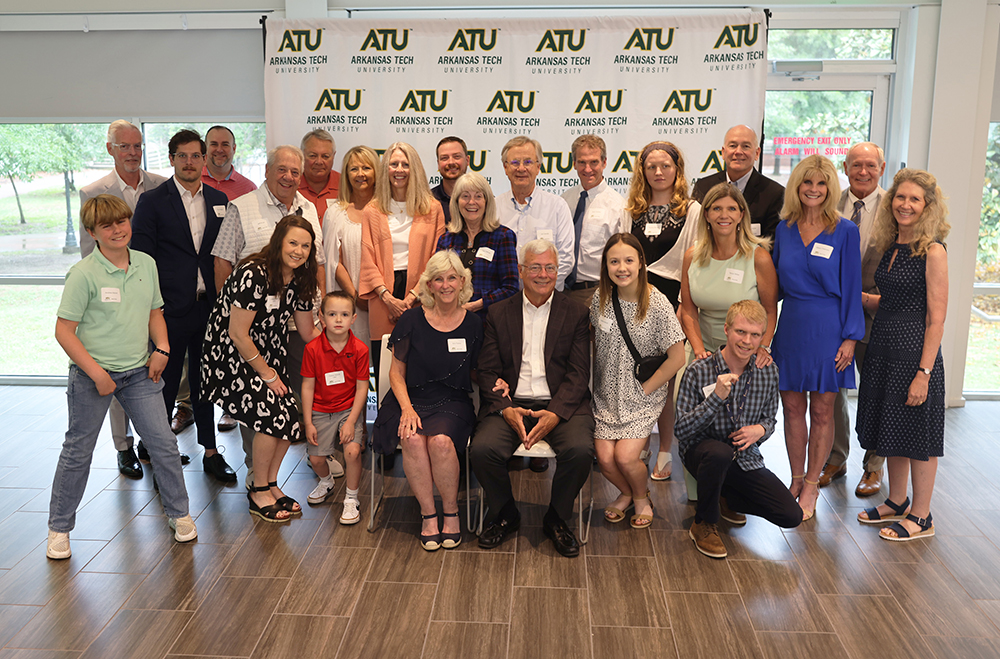
When the 2 p.m. commencement ceremony at Tucker Coliseum concluded on Saturday, May 11, so did the ATU career of Philip Parker.
“I could do it in terms of my want to until I’m 80,” said Parker, a two-time ATU Faculty Award of Excellence recipient. “But, I felt like it’s time. You just don’t know how long you have. How long is your retirement going to be? I don’t know. There are things we want to do and places we want to go. It will be a paradigm shift, and it will probably take a little getting used to, but I am excited about it. I’m not excited about leaving. Some people can’t wait to get to that retirement day. That’s never been me.”
For the first time since 1977, someone else occupies room 103 in Witherspoon Hall. The various awards and commendations gathered over 47 years have been removed from the walls.
And that Ludwig drum set is at home with Phil.
“It was in storage for a long time,” said Parker. “That’s just about what this thing looked like when I bought it in ’68. That silver sparkle does not fade like some of the pearl finishes. My playing is going to be getting back into drumming, which is why I wanted to get into this thing from the beginning. I love playing drums.”
After all these years, Phil’s still chasing that dream of being like Ringo. We all have our own Ringo…that figure that inspired us to pursue something just because we love it…don’t we?
For countless ATU alumni, Mr. Parker is that figure. To them, he’s bigger than the Beatles.
